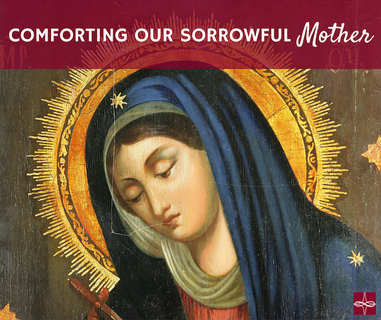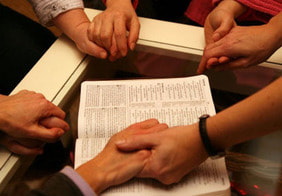|
What do you do when you are feeling sad, scared, or anxious? Where do you turn for a source of comfort?
The Blessed Mother knows all about sorrow. She is always ready to comfort any one of her children who come to her in prayer. But, have you ever thought about offering comfort to her? The Feast of Our Lady of Sorrows is today, September 15, 2015. Perhaps you might be able to find a little bit of time to spend with her. Much less familiar than the Rosary is the Chaplet of the Seven Sorrows. The chaplet is made up of seven groups of seven beads. Each group is separated by a single bead. In praying the chaplet, you would meditate on each of the seven sorrows while reciting one Our Father and seven Hail Mary’s. If you would like to pray the chaplet, this webpage can be of help. The Seven Sorrows of the Blessed Virgin Mary: The Prophecy of Simeon The Flight into Egypt The Child Jesus Lost in the Temple Mary Meets Jesus Carrying His Cross Mary at the Foot of the Cross Mary Receives the Body of Jesus Mary Witnesses the Burial of Jesus The seven sorrows span from the earliest days of Jesus’ life to His final hours. All of the Blessed Mother’s sorrows tie back to her Son. For a mother, very few things compare to watching the child she loves hurting. Although the Blessed Mother certainly put her entire trust in God, she still would have known terror when the Holy Family fled to Egypt to escape the threat of King Herod to save their precious newborn Son. Not only was the Holy Family far from home, but they had no idea when it might be safe to return to Nazareth. Any parent can tell you how scary it is when their child is lost. No words would be adequate to describe how scared Mary must have felt as she and Saint Joseph spent three full days searching for Jesus before finding Him teaching the elders in the temple. The next time you ask the Blessed Mother for her intercession before God, remember that she understands sorrow and anxiety. During her own life, the Blessed Mother understood suffering; just like all of us today understand the experience of suffering in our own lives. She is always there, more than happy to pray for us. Perhaps you might return the favor, and find a bit of time to spend with her. Our Lady of Sorrows, pray for us! Jennifer Beckmann is an Administrative Secretary for the United States Conference of Catholic Bishops.
0 Comments
As Catholics, we have the great fortune of having at our fingers an inexhaustible treasure trove of prayers to guide us in countless meditations, devotions, intercessions, and spiritual exercises. All of it is oriented to helping us recognize and remember God’s presence in our lives, and to call upon Him in thanksgiving, praise, petition, intercession, or blessing and adoration. The Church, of course, does not hold a monopoly over the varying forms of prayer but continues to invite the faithful to contribute to her wealth and so grow in holiness and piety. As one makes his or her journey of faith, he or she will invariably develop preferences in offering prayers to the heavens which likely change as that person matures or has different experiences in life. Exposing oneself to the diversity of prayer is a wonderful thing as it allows one to personally discover and experience new dimensions of spirituality in our Faith.
Growing up, I had been accustomed to vocal prayer as it gave a feeling of substance to my calling upon the Lord and His response. For example, I would pray aloud during Mass and would hear God’s Word being proclaimed back to me. Of course, if I was not actively paying attention to that Word or if my mind or heart were absent, my prayers would be for naught and be reduced to mere words: “Whether or not our prayer is heard depends not on the number of words, but on the fervor of our souls” (St. John Chrysostom, see CCC 2700). The trouble I sometimes had with my private prayer was that I would be speaking to God without really listening for His reply. When I arrived at The Catholic University of America as a freshman I was immediately exposed to new expressions of the Faith. One of my favorite forms of prayer turned out to be radically different from everything I had encountered beforehand. At the first Praise and Worship Adoration of the year I was thrilled to be seated in the packed St. Paul’s chapel at 9 PM on a Wednesday. Even more so, I had never before experienced so much energy and emotion by a congregation (especially one consisting mainly of young people) poured into song. Immediately after the homily’s conclusion, however, the lights were turned off and everyone fell to their knees. In the darkness the only thing visible before us on the altar was the monstrance containing the Blessed Sacrament. The next ten or fifteen minutes served to introduce me to contemplative prayer, in which I was able to connect with our Lord in a new and incredibly intimate way. As St. John Vianney described the experience, “I look at him and he looks at me.” By focusing on His true and beautiful Presence before me, I forget about all the distractions in my life: the voices in my head scattering my thoughts, my desires, my worries, my exhaustion, etc. I simply place myself before Him and gaze at Him in the stillness. Scripturally, I’m reminded of Mary’s tender gazing at her Son as she held Him in her arms, both at His birth (cf. Matthew 2:11) and His death (cf. John 19:37), as well as Mary of Bethany’s gazing upon the Lord when He ministered to her household (see Luke 10:39). This silent but ineffable expression of love is not passive but an obedience— and test— of faith, especially as my senses cannot comprehend the Real Presence (see CCC 2715-2717). No matter what form of prayer one prefers, all prayer must be based in humility (see Matthew 23:12, CCC 2559-2560). It is God’s gift to us, especially since “we do not know how to pray as we ought” (Romans 8:26). As prayer is from the heart, “if our heart is far from God, the words of prayer are in vain” (CCC 2562; cf. CCC 2563). Finally, no matter what we pray for, we must never underestimate the power of our words. Pope Francis has stressed that “prayer, in the face of a problem, a difficult situation, a calamity… is opening the door to the Lord, so that He can do something. If we close the door, God can do nothing!” Like the Psalmist David sings, we can always find comfort and assurance in God’s presence: O God, you are my God, I seek you, my soul thirsts for you; my flesh faints for you, as in a dry and weary land where there is no water. So I have looked upon you in the sanctuary, beholding your power and glory. Because your steadfast love is better than life, my lips will praise you. So I will bless you as long as I live; I will lift up my hands and call on your name (Psalm 63:1-4). Thomas Wong is an undergraduate at The Catholic University of America in Washington, D.C. This Lent, my 2nd grade class is in charge of encouraging our school to donate to CRS Rice Bowl, a program which helps raise money for those who are less fortunate in 6 places around the world. Our school’s efforts help students raise awareness of hunger and poverty. My class has been determined to give all they can in the past for service projects, but what sets this project apart? That is the question I have asked my students to ponder. One girl told me that her snack after school is Doritos, so for each day she doesn’t snack on this favorite treat, a quarter will be added to her jar for someone “hungrier than me.” Another boy told he scours his house and cars for loose change, and drops it in the Rice Bowl whenever he finds anything, even a penny. He asked me, “Every bit counts, right Ms. Kirby?” Indeed it does.
As Pope Francis reminded us at the beginning of the Lenten Season, our fast must be a fast from indifference toward others. The time has come for us to use these remaining 40 days to contemplate our actions toward others, striving for the utmost respect and care for them. Instead of searching for ways to improve our own lives, maybe it is time that we turned to the poor and vulnerable and improve theirs. Francis writes, “Indifference to our neighbor and to God also represents a real temptation for us Christians. Each year during Lent we need to hear once more the voice of the prophets who cry out and trouble our conscience.” It is not sacrifice to give of our excess or to simply change our diets during Lent, our Holy Father is calling us to fast from our indifference and turn to love. In this New Evangelization, there are tangible and realistic ways for each and every one of us to change hearts. This change must start within our own broken and sinful hearts and through God’s mercy and forgiveness. For each thing we do for our hearts, let’s do something for someone else. Here are some ways you could “fast for indifference”: 1. Do an Examination of Conscience and ask God to forgive your sins through the Sacrament of Reconciliation 2. Go and forgive those who have wronged you 3. Pray for those in your life 4. Intercede for others each day 5. Fast and acknowledge the poor 6. Volunteer in some way, perhaps by serving in a soup kitchen or shelter 7. Add prayer time to your day 8. Write in a journal 9. Attend Mass more frequently As you go about your day during this Lenten season, stop and think about what Jesus has done for your life and what you have done for others. Contemplate all that you have done and remember your responsibility to love others as Christ loved us all. If what we can give only fills a CRS Rice Bowl, or we give up indifference and care deeply for the poor, just know that “every bit counts.” Krissy Kirby is a teacher for the Archdiocese of Washington, D.C. To learn more on the CRS Rice Bowl please check out our Lenten Resources! Recently, I joined a Catholic group for young adults in my parish. Once a month we have a group dinner and host a guest speaker to talk informally about certain topics in our Catholic faith. One of the speakers discussed the importance of community prayer, a topic that stuck with me so much so that I wanted to share the message.
First, prayer is essential for our spiritual growth and personal well-being. God does not intend for us to bear our crosses alone. In Matthew 11:28-30 Jesus said, “Come to me, all you who labor and are burdened, and I will give you rest. Take my yoke upon you and learn from me, for I am meek and humble of heart; and you will find rest for yourselves. For my yoke is easy, and my burden light.” Being a part of a faith community serves as a support system for us. We rarely like to be alone. Don’t we all crave sharing meals with friends and family? In fact, Jesus shares the source and summit of our faith with us over a community meal. Community strengthens and unites us in our faith. Our community even prays for our intentions at Mass. Therefore, community prayer is another way for us to become closer to God through others. The communion of saints and angels are also a part of our community. Saints and angels can pray on our behalf, with us and for us. The Catechism of the Catholic Church states, “[the saints’]intercession is their most exalted service to God’s plan. We can and should ask them to intercede for us and for the whole world.” We are never alone in our prayers. Instead of trying to figure out how to pray for the intercession from every saint, our speaker suggested picking a few we feel really close to and sense a calling toward to ask for prayers on our behalf. Family prayer is the first place of our prayer education, also mentioned in the Catechism. Prayers over meals, memorizing prayers of the rosary, praying for a good grade on a test, and the list goes on. Our introduction to faith and prayer begins in the community of our home. This is why it is so important to make family prayer a priority. St. Augustine says, “For he who sings praise, does not only praise, but also praises joyfully; he who sings praise, not only sings, but also loves Him who he is singing about/to/for. There is a praise-filled public proclamation in the praise of someone who is confessing/acknowledging (God), in the song of the lover (there is) love.” The Mass, the Liturgy, is the ultimate community prayer. This is one reason why attending Mass is vital to our faith. Liturgical prayer is a public prayer following prescribed ritual intended to unite individuals with God through Christ. We are renewed each week in community prayer by attending and participating in the Mass. As always, it is necessary to have individual structured prayer time every day. This is something I struggle with and have to continually be reminded of myself. To remember the time to share with God, setting a routine of prayer and remaining disciplined in that routine can help. One of the sisters who taught at the Catholic high school I attended said for us to hide our shoes under our beds so in the morning we kneel to get them and remember to pray! Take some time today to remember to pray, and to look at the different prayer communities in your life! Dana Edwards is a recent graduate of the University of Florida. She currently resides in Tallahassee, Florida where she volunteers as a lector and with communication outreach at her local parish, Good Shepherd Catholic Church. Today, on the Memorial of Our Lady of the Rosary, we are reminded of the important role that the rosary plays in our daily lives. It is a form of prayer that we seek when we are struggling and need the comforting embrace of a mother. It is a form of prayer that is joyful, celebrating our successes with Christ through Mary. Devotions to Mary have always been an important aspect of my faith. In particular, the rosary has helped me through many tough times in my life and given me the strength to continue forming my life to Christ, but its importance was reinforced in the first few months of my college career when I joined the Knights of Columbus. Upon entering the Order, Knights are given a rosary as a symbol of our devotion to Mary and a reality of our reliance on her example and her intercession with God
But why should we say the rosary? Saint John Paul II gives a clear picture of the rosary’s importance: “The Rosary mystically transports us to Mary's side as she is busy watching over the human growth of Christ in the home of Nazareth. This enables her to train us and to mold us with the same care, until Christ is “fully formed” in us.” When we pray the rosary, many of us are seeking the warm embrace of a mother, someone who can reassure us in our fears and give us the strength to live out each day for Christ. Mary is our mother in every sense of that word. Christ, moments from death, says to Mary, “Behold, your son,” and to the disciple whom he loved, “Behold, your mother.” With these words Christ gives Mary to all of us as our mother, the Mother of the Church, and with these words we are formed by her just as Christ was. The rosary does not pull our attention away from Christ, but rather joins us with him through our love of Mary. John Paul II tells us in Rosarium Virginis Mariae, “Never as in the Rosary do the life of Jesus and that of Mary appear so deeply joined. Mary lives only in Christ and for Christ!” The rosary allows us to participate in that union and calls us to share in the life of Christ through our relationship with his Mother. Each time we pray the rosary we focus on the Joyful, Sorrowful, Glorious, or Luminous mysteries. These are not only drawing us closer to Mary, but to the life of Christ as each set of mysteries is grounded in the Gospel. When we pray the rosary we do not just repeat prayers over and over again, but rather we are given the opportunity to live out a different aspect of the life of Christ with each decade. Repetition is an important aspect of the rosary, but is it actually repetition? Archbishop Fulton Sheen in his book “The World’s First Love” tells us that it is not repetition for each time we say the rosary, “we are saying to God, the Trinity, to the Incarnate Saviour, to the Blessed Mother: "I love you, I love you, I love you." Each time it means something different, because, at each decade, our mind is moving to a new demonstration of the Saviour's love.” Who better to remind us of the Christ’s love than Mary, the Mother of God, our mother, who raised Jesus, formed him, and followed him. Who better to emulate than Mary, who watched her son suffer and die on the cross for our salvation. Each time we say the rosary we are embraced by our mother, we are renewed in our faith, and we are reminded of God’s love. “Remember, O most gracious Virgin Mary, that never was it known that anyone who fled to thy protection, implored thy help, or sought thine intercession was left unaided. Inspired by this confidence, I fly unto thee, O Virgin of virgins, my mother; to thee do I come, before thee I stand, sinful and sorrowful. O Mother of the Word Incarnate, despise not my petitions, but in thy mercy hear and answer me. Amen.” Nicholas Shields is a young professional from Washington, D.C. Angel of God, my guardian dear, To whom God’s love commits me here, Ever this day, be at my side, To light, to guard, to rule, and guide. Amen  Today we celebrate the Memorial of the Guardian Angels. The prayer above was one my mother taught me when I was a child, and even now I can easily recall it. She taught me to say it as I was going to bed, a reminder that my Guardian Angel would be watching me as I slept. Throughout Scripture, we see the importance of angels and their role as intermediaries between us and God. A prime example of this is the Angel Gabriel appearing to Mary to announce to her that she would give birth to the son of God. But, beyond the known archangels, we recognize the role of individual Guardian Angels. The Catechism of the Catholic Church affirms that “from infancy to death human life is surrounded by their [angels'] watchful care and intercession. Beside each believer stands an angel as protector and shepherd leading him to life. Already here on earth the Christian life shares by faith in the blessed company of angels and men united in God" (CCC, n. 336). When I saw that today was the Memorial of the Guardian Angels, it got me thinking about this idea of a Guardian Angel, something I hadn’t thought about a lot as an adult. As children, many of us are taught about our Guardian Angel, who is continually watching over us. It’s a comforting thought, to think that there is a specific angel “assigned” to protect and watch over you…and only you! It’s creates a sense of security and safety, especially in the mind of a young child. In today’s Gospel reading, Jesus alludes to these angels, remind us to “not despise one of these little ones, for I say to you that their angels in heaven always look upon the face of my heavenly Father”. (MT 18:10) Now that I’m older, I certainly don’t think of a Guardian Angel in the same way. As a child I imagined an invisible person, following me around constantly to make sure nothing bad happened (which is a daunting task for anyone, but I pity the angel assigned to protect me, with my proclivity for clumsiness!). As comforting as the idea of an invisible protector seems to me now, I recognize the idea of a Guardian Angel as something different. Guardian Angels can be seen as a symbol of God’s enduring love for us. In the huge expanse of the human population it is often easy to feel insignificant. But the symbol of a Guardian Angel serves to remind us that God’s love is individual and complete! We were made in the image and likeness of God, and He truly loves each and every one of us on a personal level. So tonight, say a prayer to your Guardian Angel, remembering that God watches over you through these Angels, a sign of his unending Love! Rebecca Ruesch is the Blog Editor for the Catholic Apostolate Center The following is a portion of Blessed John Paul II’s address to the Pallottine Fathers and Brothers on
October 6, 1998, speaking to them about their work in reviving faith, rekindling charity and forming apostles. …To live the faith means to share in Christ's life. In Jesus we can discover our true nature and fully appreciate our personal dignity. Proclaiming Christ so that the image of God may be restored to each person in all its fullness is the ultimate goal of the “new evangelization”. You, called in a particular way by your charism to revive faith and rekindle love in every situation, should be very clearly aware of the preferential option for the “image of God” that is waiting to be revealed in the life of every brother and sister. Recognize Christ’s face in everyone, appreciating every human being regardless of his condition or status. This is what St Vincent Pallotti did, whose sole concern was the interior renewal of human beings for the sake of their sanctification. To imitate his apostolic zeal, you must first strive for personal holiness. Only in this way will you be able to foster it in others, by remembering the universal call to holiness clearly made by the Second Vatican Council. It is this awareness that must motivate your contribution to the work of the new evangelization. In this way you will be effectively prepared to enter the new millennium and will actively co-operate in fulfilling the mission that the Father of our Lord Jesus Christ entrusted to the entire ecclesial community. The commitment to personal holiness must be lived within your communities in the various parts of the world: work in unity and harmony to be authentic witnesses to the Gospel for those you meet in your daily ministry. In the Apostolic Exhortation Vita consecrata I wrote: “The Church entrusts to communities of consecrated life the particular task of spreading the spirituality of communion, first of all in their internal life and then in the ecclesial community, and even beyond its boundaries, by opening or continuing a dialogue in charity, especially where today’s world is torn apart by ethnic hatred or senseless violence” (n. 51). It is by witnessing to the fraternal life, understood as a life shared in love, that you become an eloquent sign of ecclesial communion (cf. ibid., n. 42). This deep understanding among yourselves will help you live your “unity in Christ” and make you ready and willing to respond to each person’s spiritual and material needs. In this regard your founder loved to say over and over that “the gift of cooperating in the salvation of souls is one of the most divine” (Opere complete XI, p. 257). This gift should be shared with lay people, your daily co-workers in the apostolate, as well as within your institute. Involve them and welcome them into your life of communion. “Today”, I wrote in the above-mentioned Apostolic Exhortation Vita consecrata “many institutes have come to the conclusion that their charism can be shared with the laity” (n. 54). “The participation of the laity often brings unexpected and rich insights into certain aspects of the charism, leading to a more spiritual interpretation of it and helping to draw from it directions for new activities in the apostolate” (n. 55). In this way, the Society of the Catholic Apostolate, conceived and founded by St Vincent Pallotti, will allow you not only to co-ordinate the different resources of your communities, but also to be at the very heart of the Church’s apostolic mission in today's world. May you find help in Mary, faithful and obedient handmaid of the Lord and an excellent example of fidelity to the apostolate. United in prayer with the disciples in the Upper Room of Jerusalem while awaiting the gift of the Holy Spirit, she offers you the example of constant prayer, willingness and active commitment to the Church’s mission. May God renew the marvels of Pentecost in you and in your institute through her motherly intercession… Today marks the 8th anniversary of Bl. John Paul II death. He was a man who proclaimed Christ triumphant victory over death with great zeal. This day, as we pray for his intercession, let us mediate on his words on the Risen Christ that he shared on Easter Sunday, April 23, 2000.
'O death, where is your sting?' (1 Cor 15:55) "Mors et vita duello conflixere mirando . . ." "Death and life have contended in that stupendous combat: The Prince of life, who died, reigns immortal" (Easter Sequence). Once again, today, the whole Church pauses in amazement at the empty tomb. Like Mary Magdalen and the other women, who came to anoint with spices the body of the Crucified One, like the Apostles Peter and John who came running at the word of the women, the Church bows before the tomb in which her Lord was placed after the crucifixion. A month ago, as a pilgrim in the Holy Land, I had the grace of kneeling before the stone slab which marks the place of Jesus' burial. Today, Easter Sunday, I make my own the proclamation of the heavenly messenger: "He is risen, he is not here" (Mk 16:6). Yes, life and death were locked in combat and Life was victorious for ever. All is once again oriented to life, to Eternal Life! "Victimae paschali laudes immolent christiani . . ." "Christians, to the Paschal Victim offer sacrifice and praise. The sheep are ransomed by the Lamb; and Christ, the undefiled, has sinners to his Father reconciled". The words of the Easter Sequence marvellously express the mystery accomplished in Christ's Passover. They point to the power of renewal flowing from his Resurrection. With the weapons of love, God has defeated sin and death. The Eternal Son, who emptied himself to become the obedient servant to the point of dying on the Cross (cf. Phil 2:7-8), has conquered evil at its roots by opening to contrite hearts the path of return to the Father. He is the Gate of Life who at Easter overcomes the gates of hell. He is the Door of salvation, opened wide for all, the Door of divine mercy, who sheds a new light on human existence. The Risen Christ signals the paths of hope along which we can advance together towards a world more just and mutually supportive, in which the blind egoism of the few will not prevail over the cries of pain of the many, reducing entire peoples to conditions of degrading misery. May the message of life proclaimed by the angel near the stone rolled back from the tomb overturn the hardness of our hearts; may it lead to removing unjustified barriers and promote a fruitful exchange between peoples and cultures. May the image of the new man, shining on the face of Christ, cause everyone to acknowledge the inalienable value of human life; may it encourage effective responses to the increasingly felt demand for justice and equal opportunity in all areas of society; may it impel individuals and States to full respect for the essential and authentic rights rooted in the very nature of the human person. Lord Jesus, our Peace (Eph 2:14), Word made flesh two thousand years ago, who by rising from the dead have conquered evil and sin, grant the human family of the third millennium a just and lasting peace; bring to a happy outcome the talks undertaken by people of good will who, despite so many doubts and difficulties, are trying to bring an end to the troubling conflicts in Africa, the armed clashes in some countries of Latin America, the persistent tensions affecting the Middle East, vast areas of Asia, and some parts of Europe. Help the nations to overcome old and new rivalries, by rejecting attitudes of racism and xenophobia. May the whole of creation, inundated by the splendour of the Resurrection, rejoice because "the brightness of the eternal King has vanquished the darkness of the world" (Easter Proclamation). Yes, Christ has risen victorious, and has offered man, Adam's heir in sin and death, a new heritage of life and glory "Ubi est mors stimulus tuus?". "O death, where is your sting?" (1 Cor 15:55), exclaims the Apostle Paul, touched on the road to Damascus by the light of the Risen Christ. His cry echoes down the centuries as the proclamation of life for the whole of human civilization. We too, the men and women of the twenty-first century, are invited to be mindful of this victory of Christ over death, revealed to the women of Jerusalem and the Apostles, when they arrived hesitantly at the tomb. Through the Church, the experience of these eye-witnesses has come down to us too. It is a significant part of the journey of the pilgrims who, during this Year of the Great Jubilee, are entering through the Holy Door, and going away with renewed courage to build pathways of reconciliation with God and with their brothers and sisters. At the heart of this Year of grace, may the proclamation of Christ's followers be heard more loudly and clearly, a joint proclamation, beyond all divisions, in ardent longing for full communion: "Scimus Christum surrexisse a mortuis vere". "Yes, that Christ is truly risen from the dead we know, Victorious King, your mercy show!" Amen URBI et ORBI Message of His Holiness Pope John Paul II |
Details
Archives
April 2024
Categories
All
|
About |
Media |
© COPYRIGHT 2024 | ALL RIGHTS RESERVED








 RSS Feed
RSS Feed